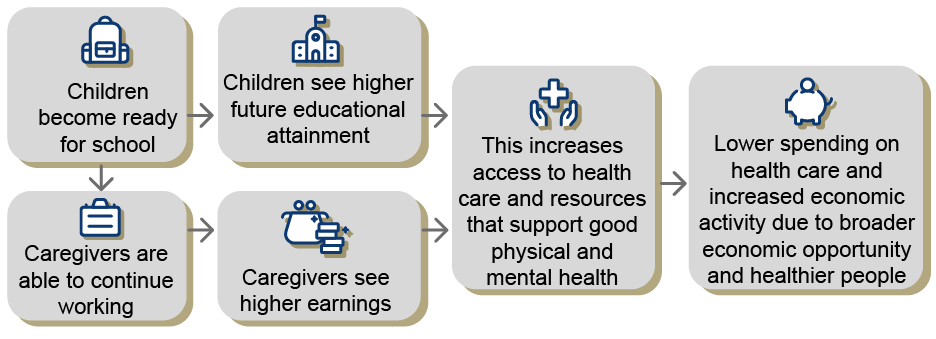Early care and education (ECE) centers play an integral role in the health and well-being for many children and families in Georgia. The holistic approach ECE centers provide has a substantial, lasting and intergenerational impact on health and well-being, particularly for children from families with low incomes.
 How Early Childhood Education Benefits Health and Well-Being
How Early Childhood Education Benefits Health and Well-Being
ECE centers help parents engage in the workforce, but child care does much more to help children and families thrive. Their services are aimed at producing children who are healthy, ready for kindergarten, have access to proper nutrition, are socially and emotionally competent and offer family support services.[1]
Immediate and Long-Run Impacts on Health
- Early developmental screening through partnerships with Babies Can’t Wait
- Nutritious food for children and families using federal dollars and local partnerships
- On schedule, age-appropriate preventative and primary care increased from 46 percent at enrollment to 84.6 percent by the end of the year in 2019 for children in Head Start [2]
- Mental Health Specialist or home visitors support families with issues such as substance use, domestic violence or stress in Head Start and some Quality Rated programs
- Helps to mitigate or prevent adverse childhood experiences by decreasing parental stress and providing positive experiences to support children’s social-emotional development
- Children enrolled in programs incorporating nutrition and health have better health as adults, with lower prevalence of risk factors for chronic illnesses like stroke and diabetes
Early Childhood as a Tool for Health Equity
An analysis of over 100 public assistance programs found that investing directly in health and education for children in households with low incomes have the best cost-benefit ratios.[3] Currently there are only enough funded spots or subsidies allotted to serve half of the estimated 364,000 eligible children in low-income working families who need it.[4] Furthermore, a lower share of potentially eligible Latinx and Asian children receive child care subsidies compared to other racial groups, and Black students are missing more class time as they are 3.6 times more likely to be suspended than white students.[5],[6] Addressing racial bias and program accessibility can help all children realize the health benefits of ECE.
The child care shortage caused by the pandemic is troubling news for the economy and the health of working families, disproportionately impacting low-wage workers and people of color, who shoulder some of the most severe financial and health burdens associated with the pandemic yet are some of the first workers called back to job sites.[7] Families are not the only ones in survival mode: 29 percent of surveyed centers in Georgia stated they could not survive closing for more than two weeks without significant public investment.[8]
Policy Solutions to Improve Health in Georgia through Early Childhood Education
Building on the recent boost in child care funding by expanding access to the CAPS program. State lawmakers can continue this progress by increasing the amount of child care subsidies available to low-income families through CAPS.
Increasing coordination between state health agencies and DECAL. The Department of Behavioral Health and Developmental Disabilities could extend services to children under four in their System of Care State Plan. The Department of Community Health can update their Medicaid reimbursement policy to allow payment for social-emotional screenings for infants and toddlers and therapy sessions that treat the child and caregiver together.[9]
Federal lawmakers should include funding for child care programs as part of the COVID-19 relief efforts. An allocation of $50 billion in federal funding for child care would help cover over five months of emergency care and relief, Georgia’s share being $2.1 billion.[10]
Download our fact sheet here.
[1] Georgia Department of Early Care and Learning, Bright from the Start. (2020). 2019 annual report. https://www.decal.ga.gov/documents/attachments/BFTSAnnualReport2019.pdf
[2] Georgia’s Cross Agency Child Data System. (2019). www.gacacds.com
[3] Hendren, N., & Sprung-Keyser, B. (2020). A unified welfare analysis of government policies. The Quarterly Journal of Economics, 135(3), 1209–1318. https://doi.org/10.1093/qje/qjaa006
[4] Georgia Department of Early Care and Learning. (2019). CAPS Policy – Priority Groups.
[5] National Black Child Development Institute. (2019). State of the Black child report card: Georgia. https://www.nbcdi.org/sites/default/files/resource-files/NBCDI%20SOBC%20Report%20Card%20Georgia.pdf
[6] Ullrich, R., Schmit, S., & Cosse, R. (2019, April). Inequitable access to child care subsidies. The Center for Law and Public Policy. https://www.clasp.org/sites/default/files/publications/2019/04/2019_inequitableaccess.pdf
[7] Gould, E. & Shierholz, H. (2020). Not everybody can work from home: Black and Hispanic workers are much less likely to be able to telework. Economic Policy Institute. https://www.epi.org/blog/black-and-hispanic-workers-are-much-less-likely-to-be-able-to-work-from-home/
[8] National Association for the Education of Young Children. (2020, March 27). A state-by-state look at child care in crisis: Understanding early effects of the coronavirus pandemic. https://www.naeyc.org/sites/default/files/globally-shared/downloads/PDFs/our-work/public-policy-advocacy/state_by_state_child_care_crisis_coronavirus_surveydata.pdf
[9] Georgia Early Education Alliance for Ready Students & National Center for Children in Poverty. (2019, September). What Policymakers in Georgia need to know about infant-toddler social-emotional health. http://geears.org/wp-content/uploads/IECMH-Brief-for-Policymakers-FINAL.pdf
[10] Schmit, S. (2020, May). Why we need $50 billion in pandemic child care relief: A state-by-state estimate. The Center for Law and Social Policy. https://www.clasp.org/sites/default/files/publications/2020/05/2020_50billionpandemicchildcare_0.pdf










